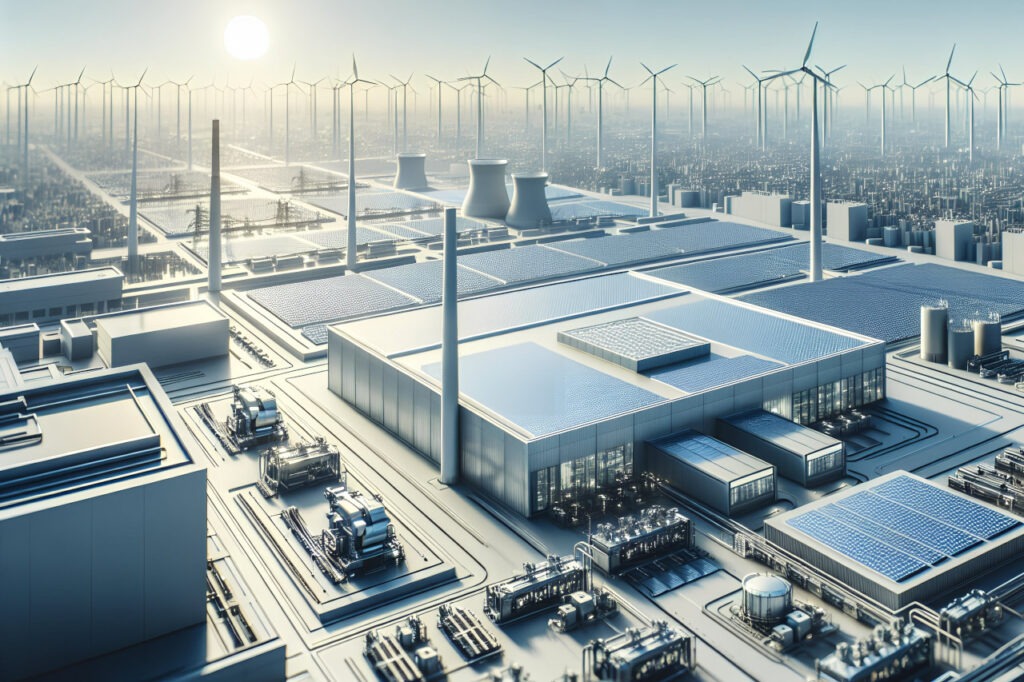Dieser Beitrag ist auch verfügbar auf:
Deutsch
The key to future market viability
Energy efficiency has become a key factor in the future viability of industrial companies. By using energy efficiently, companies can
- Reduce costs: Companies can achieve significant savings through tailor-made measures and use their resources more efficiently.
- Increase Sustainability and reduce emissions: Less energy consumption also means a reduction in CO₂ In this way, companies not only contribute to climate protection, but also meet the strict legal requirements and the growing expectations of customers and partners in terms of environmental responsibility.
- Increase competitiveness: In a market that is focusing on sustainability, energy-efficient processes and technologies improve the position in global competition.
These technologies can revolutionize the energy efficiency of industrial production
1. Smart sensor technology
Modern sensor technologies such as IoT sensors, vibration and acoustic sensors, optical sensors (e.g. LIDAR), pressure and flow sensors, and environmental sensors make it possible to monitor and optimize processes in real time. For example, smart sensors can detect inefficient machines or energy losses at an early stage so that corrective measures can be taken immediately.
2. Energy-efficient motors and drive systems
Electric motors account for a significant part of industrial energy consumption. The use of highly efficient motors and intelligent drive systems can drastically reduce energy requirements. Such systems include frequency converters. These adjust the speed of motors to the actual demand by changing the frequency and voltage of the current.
3. Heat recovery
Many industrial processes generate excess heat that is lost unused. With heat recovery technologies such as heat exchangers or thermal energy storage, this heat can be used e.g. to heat buildings or as an energy source for other processes.
4. Artificial intelligence (AI) and big data
AI-supported systems can analyze large amounts of data from production processes to recognize patterns and make optimization suggestions. Companies such as Siemens and Schneider Electric rely on AI and the Industrial Metaverse to proactively control energy consumption and leverage efficiency potential.
5. Renewable energies in production
Photovoltaics, wind power or biomass are already being integrated into industrial energy strategies. Combined with efficient energy storage solutions, companies can significantly reduce their need for fossil fuels.
Energy efficiency best practices
1. Energy audits and monitoring
A comprehensive energy audit is the first step in identifying inefficient processes and making targeted improvements. All areas of energy consumption are analyzed to identify weaknesses and potential energy saving measures. Ongoing monitoring of energy consumption is essential to secure these savings in the long term.
Modern monitoring systems provide real-time data that make it possible to understand consumption patterns and respond quickly to deviations or inefficient practices.
2. Employee training
The use of energy efficiency technologies alone is not enough to achieve sustainable savings. Through training, employees can also learn to use energy more consciously in their everyday work and recognize energy saving measures.
This applies both to the efficient use of machines and equipment and to understanding the impact of their own behavior on energy consumption. Training can help ensure that the entire workforce actively participates in reducing energy consumption.
3. Integration into the corporate strategy
Energy efficiency must be integrated into the company’s long-term planning and vision. This means that energy goals and initiatives are integrated into all areas of the company, from product development to production and daily operations. Only when energy efficiency is anchored as a strategic goal can companies achieve sustainable success and increase their competitiveness. The clear focus on energy efficiency as a long-term goal creates a sustainable corporate culture.
4. Partnerships and networks
Exchanging ideas with other companies and participating in industry-specific networks are a valuable source of ideas and synergies. Initiatives such as the “Alliance for Energy Efficiency” offer the opportunity to exchange experiences and best practices and learn from the successes of others. These partnerships can also facilitate access to innovative technologies and funding.
These global players are pioneers in energy efficiency
- BMW has reduced energy consumption in vehicle production by more than 35% in recent years.
- Siemens optimizes energy consumption in its plants through automation and digital solutions, uses renewable energies and offers sustainable solutions to its customers.
- Unilever has reduced CO₂ emissions from its manufacturing operations and runs many of its factories on 100% renewable energy.
- Google uses 100% renewable energy for data centers, reduces energy consumption through AI and has neutralized CO₂
- Schneider Electric offers solutions to reduce energy consumption and uses 100% renewable energy in its own facilities.
- Microsoft is committed to carbon neutrality and is using AI to optimize energy consumption in data centers, with the goal of offsetting all historical emissions by 2030.
- Apple uses 100% renewable energy in its operations and aims to have a carbon neutral supply chain by 2030.
- The ION Power Grid is a smart grid developed in Salzburg, Austria. It increases energy efficiency through real-time monitoring, intelligent load control and seamless integration of renewable energy. Using AI and automation, it minimizes energy losses, detects faults early and promotes decentralized energy storage.
What the future has in store for us
In addition to the technologies listed above, efficient digital solutions could play an even greater role in maximizing energy efficiency in industry in the future. Technologies such as the Internet of Things (IoT) and the analysis of energy consumption via blockchain could enable even more precise monitoring and traceability of our energy consumption in the future.
In addition, there will be increasing political pressure on companies to reduce their carbon emissions. This will further increase the need for energy efficiency measures. With the right technologies and strategies, industrial companies can not only operate sustainably, but also make a significant contribution to protecting our planet.






